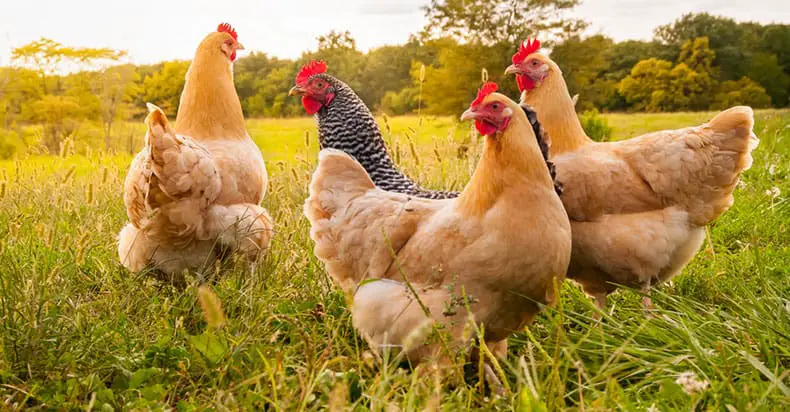Do vegans eat chicken? I’ve been asked a few times by now whether vegans can eat chicken. This is a question I get from time to time, usually posed by folks who are new to the concept of vegan diets. Maybe they’ve heard the term vegan but aren’t yet quite familiar with what the word means. They know it bears some relationship to the consumption of plants and animals, but that’s about it.
Vegans cannot eat chicken. To be a vegan, one has to avoid all meat regardless of the animal and abstain from other animal products like milk, eggs, and leather. In fact, not only is chicken non-vegan, but it’s not even suitable for vegetarians.
At least, not for true vegetarians—in the plant-based community, only flexitarians or semi-vegetarians consume meat. They do this by restricting meat consumption to certain days or limiting meat intake to only consuming certain animals (fish as with pescatarians, etc.).
What we’ll do next is look at why vegans can’t eat chicken, and why there’s often a bit of confusion around this topic. Then we’ll look at the best vegan and vegetarian alternatives to chicken.
Why Vegans Can’t Eat Chicken
We’ll look at vegan chicken alternatives below, but first let’s look at why chicken isn’t vegan friendly or cruelty free.
The Vegan Diet Is Not a Health Movement
A lot of folks who are new to researching plant-based diets assume that the vegan movement is primarily concerned with human health. And with this assumption, it’s understandable why one might think that chicken would be a vegan-friendly food.
Don’t get me wrong, chicken isn’t a health food, but it is relatively low in saturated fat compared to many other forms of meat. When people think of eating healthy, they often picture a diet of steamed naked pieces of chicken breast and broccoli.
So, if the vegan diet were strictly a health diet, I’d imagine that many vegans would occasionally allow chicken on the menu.
Alas, the vegan diet is not a health diet and never was. In fact, a vegan diet can be far from healthy depending on one’s food choices. Some vegans live on soda and chips. As long as there are no animal products in the chips or soda, such a diet does qualify as vegan.
Vegans Avoid All Animal Products

While many self-identifying vegans are primarily concerned with health and/or environmental issues, veganism is about avoiding animal exploitation.
Someone who follows a vegan diet for any reason other than concerns about animal ethics would probably best be described as a follower of a 100% plant-based diet. Not really a vegan per se.
Vegans follow a 100% plant-based diet too. This is because “plant-based diet” is really an umbrella term for diets free of animal products regardless of one’s motivation for adopting the diet.
The two terms (vegan and plant-based) are often seen as synonymous, and I tend to use them interchangeably because a vegan diet is plant-based.
But, while the prescription is always the same when it comes to 100% plant-based diets (only plants no animals), the motivations for adopting the eating style can range from health to the environment to animal ethics.
While most vegans are concerned about the environment and human health, veganism is the practice of avoiding all animal products due to animal welfare concerns. Vegans don’t wear leather or consume milk, eggs, or any form of meat be it poultry, red meat, fish, and seafood, etc.1
The vegan diet also requires one try to avoid animal by-products used in food processing.2
In sum, veganism is known as the strictest form of vegetarianism, because it requires avoiding all animal products, and rejecting the commodity status of animals.3-5
What About Eco Vegans? Can They Eat Chicken or Other Types of Meat?
Environmental veganism is a movement that focuses on following plant-based diets because eating plant-based is thought to be more environmentally sustainable.
But, above it was mentioned that a focus on animal ethics is really what separates the vegan diet from other plant-based diet groups. For this reason, many in the community (myself included) don’t really consider environmental veganism as a meaningful category of veganism.
I still use the term “eco vegan” from time to time, but I have a hard time thinking of this movement as representing a true form of veganism. The reason being is that it seems like one could be talked into eating meat if it were good for the environment.
Believe it or not, there’s something called Kangatarianism. Followers of a kangatarian diet cut out all forms of meat except for kangaroo on environmental grounds.6
They allow the addition of kangaroo meat to an otherwise plant-based diet because indigenous wild kangaroos apparently require no extra water or land for farming and produce little methane compared to cattle or other farm animals.
To be fair, they’re vegetarians and not environmental vegans. But, the point is the same. If your reasons for following a plant-based diet are grounded in environmental concerns then one need only convince you that consuming a certain animal product was environmentally sustainable and you’d be back to eating animal products.
There’s No Such Thing As Semi-Veganism
As mentioned above, a semi-vegetarian, aka flexitarian, restricts meat consumption to certain days or allows for a certain type of meat in the diet.
Most folks know about pescetarianism, a type of vegetarianism that allows for fish and other types of seafood as the sole source of meat-based protein.
But, there’s a much less common form of semi-vegetarianism known as pollotarianism or pollo-vegetarianism.
Pollotarians incorporate poultry and other birds into an otherwise traditional vegetarian diet.7,8
You probably notice “pollo” as the word for chicken in Spanish, but pollo-vegetarians allow different forms of poultry, like turkey and duck in their diet.
It’s a relatively rare form of vegetarianism but it’s been around for a few decades now.9,10
I bring this up because flexitarianism fairly mainstream now. And it’s not obvious that if there are semi-vegetarians, there wouldn’t be an equivalent in the vegan community.
But, up to now, there are no groups that identify as semi-vegan. Anything short of a diet free of animal products is considered vegetarianism or semi-vegetarianism.
The Best Vegan Alternatives to Chicken
Thankfully, as vegans, there are a few options when it comes to replacing chicken in the diet.
Seitan (All-Purpose Chicken Replacement)
This is the replacement I’ve found to be one of the most realistic. Really, seitan can be used to replace several types of meats. But, the texture is similar to chicken.
Seitan is made from gluten, the main protein found in wheat. Yes, the substance that your hipster friends claim to be allergic to.
Gluten gets a bad rap because some people are sensitive to it and there’s a condition known as celiac disease where folks have a strong immune reaction to the stuff.
But, for most of us, it’s not an issue, even in large amounts.
To make seitan, wheat flour is washed to remove the starch granules which leaves behind a sticky glutinous substance that’s then cooked and prepared to resemble meat.
Jackfruit (Fried Chicken)
Jackfruit makes a great pulled pork replacement—that’s what comes to mind when I think of jackfruit. But, this versatile fruit is used to make a wide variety of meat replacements including chicken.
This may be the most common for use in vegan fried chicken. Just search for “fried jackfruit” and you should find plenty of recipes.
Cauliflower (Wings)
Yes, you read that right. The vegan answer to buffalo wings usually involves cauliflower. These little wings look remarkably similar to the real thing, but I can’t speak to the flavor or texture. I’ve never tried them.
Just make sure the sauce you choose is vegan friendly. If you’re interested, make sure to read the article on the vegan friendliness of buffalo sauce.
Commercial Vegan “Chicken”
By vegan chicken, I just mean commercial vegan chicken replacements. Stuff that’s marketed as vegan chicken. It could be textured veggie protein or gluten as mentioned above.
I like Gardein’s chick’n nuggets and crispy tenders but there are several brands.
Thankfully, vegan chicken is becoming more and more common these days, even in grocery stores like Walmart and Target.
Is Chicken Vegan? Do Vegans Eat Chicken? Conclusion
While people adopt a plant-based diet for a variety of reasons, it’s a concern for animal ethics that sets vegans apart from others in the plant-based community.
And it’s a complete elimination of all animal products that separates a vegan diet from other forms of vegetarianism.
Chicken, depending on the cut and how it’s prepared, can be relatively low in saturated fat—at least, compared to fatty cuts of beef. But, any animal product, regardless of how healthy a given food is perceived to be by the mainstream, is considered non-vegan.
Finally, while there are flexitarians, there are no flexible vegans. The vegan diet is the least flexible diet when it comes to the inclusion of animal products.
Make no mistake, if someone claims to be a vegan because they practice Meatless Mondays or don’t eat meat most of the time, then they’re not vegan. They’re flexitarian at best.
References
- What Is a Vegetarian: The Vegetarian Society. https://www.vegsoc.org/page.aspx?pid=508
- Why Avoid Hidden Animal Ingredients? https://navs-online.org/articles/why-avoid-hidden-animal-ingredients/
- The Rise of Critical Animal Studies: From the Margins to the Centre, Routledge, 2014 (262–276). https://www.routledge.com/The-Rise-of-Critical-Animal-Studies-From-the-Margins-to-the-Centre/Taylor-Twine/p/book/9781138125919
- Animals and the Limits of Postmodernism. Columbia University Press, 2013, 206. http://cup.columbia.edu/book/animals-and-the-limits-of-postmodernism/9780231153430
- Gary Francione, “Animal Welfare, Happy Meat and Veganism as the Moral Baseline”, in David M. Kaplan, The Philosophy of Food, University of California Press, 2012 (169–189) 182. https://www.jstor.org/stable/10.1525/j.ctt7zw2cx
- Semi-Vegetarianism. https://en.wikipedia.org/wiki/Semi-vegetarianism
- Lagua, Rosalinda T; Claudio, Virginia S. (2012). Nutrition and Diet Therapy Reference Dictionary. Chapman & Hall. p. 356. ISBN 978-94-011-6880-9
- Chakrabarty, Kaveri; Chakrabarty, A. S. (2019). Textbook of Nutrition in Health and Disease. Springer. p. 296. ISBN 978-981-15-0961-2
- Green, Marilyn L; Harry, Joann. (1981). Nutrition in Contemporary Nursing Practice. Wiley. p. 205. ISBN 978-0471038924
- Guthrie, Helen Andrews. (1989). Introductory Nutrition. Times Mirror/Mosby College Publishing. p. 602. ISBN 9780801622014


